
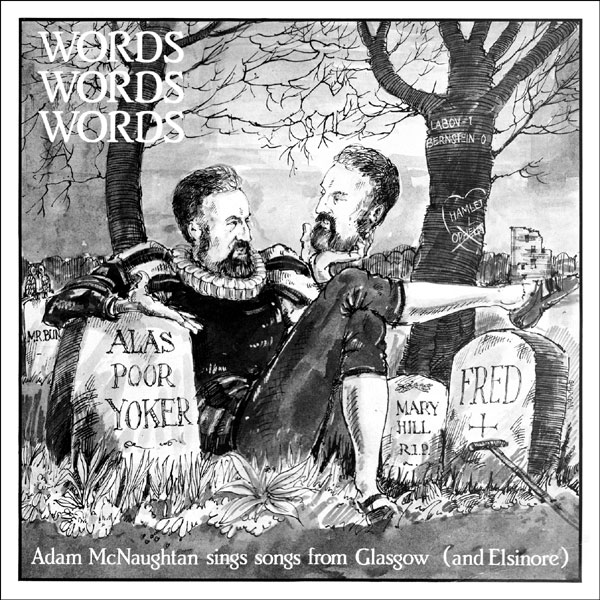 |
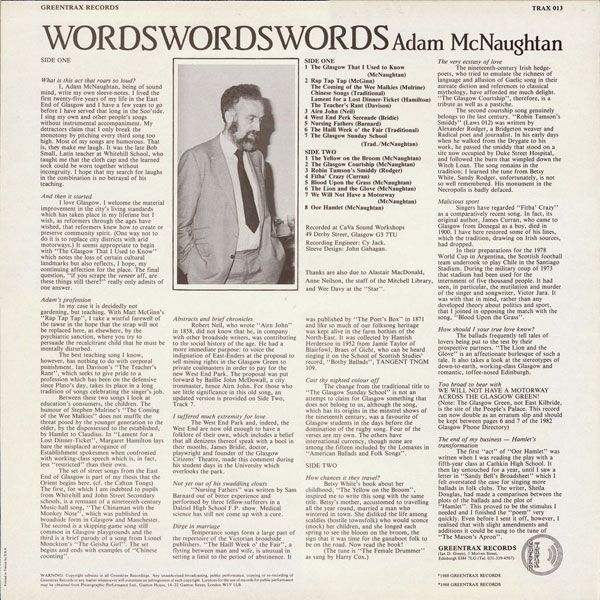
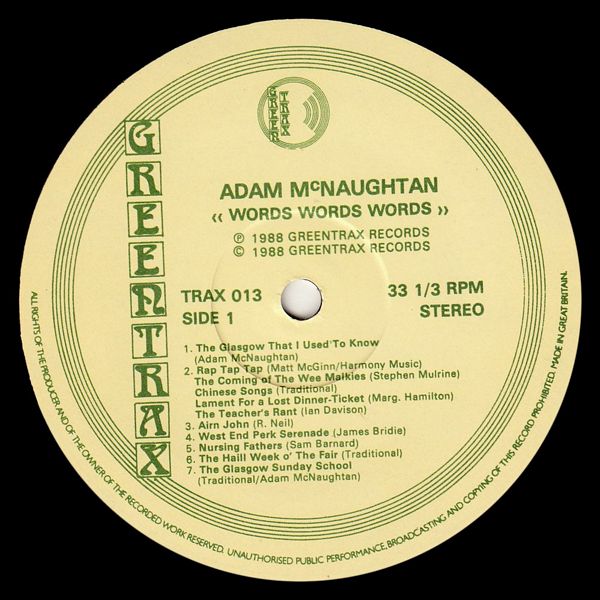
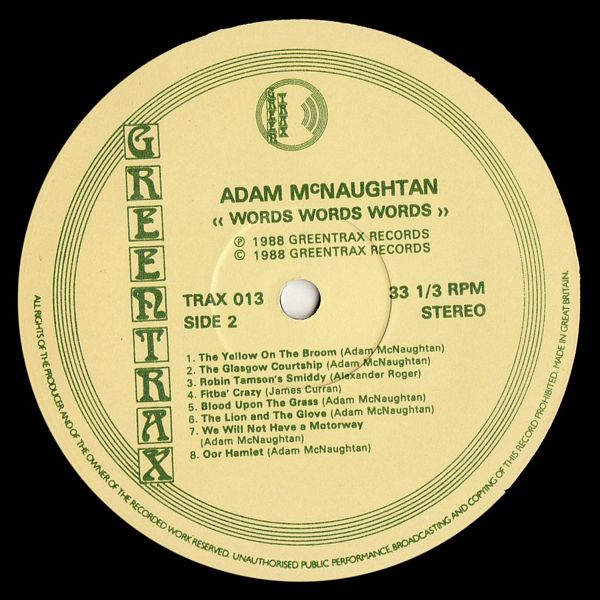 |
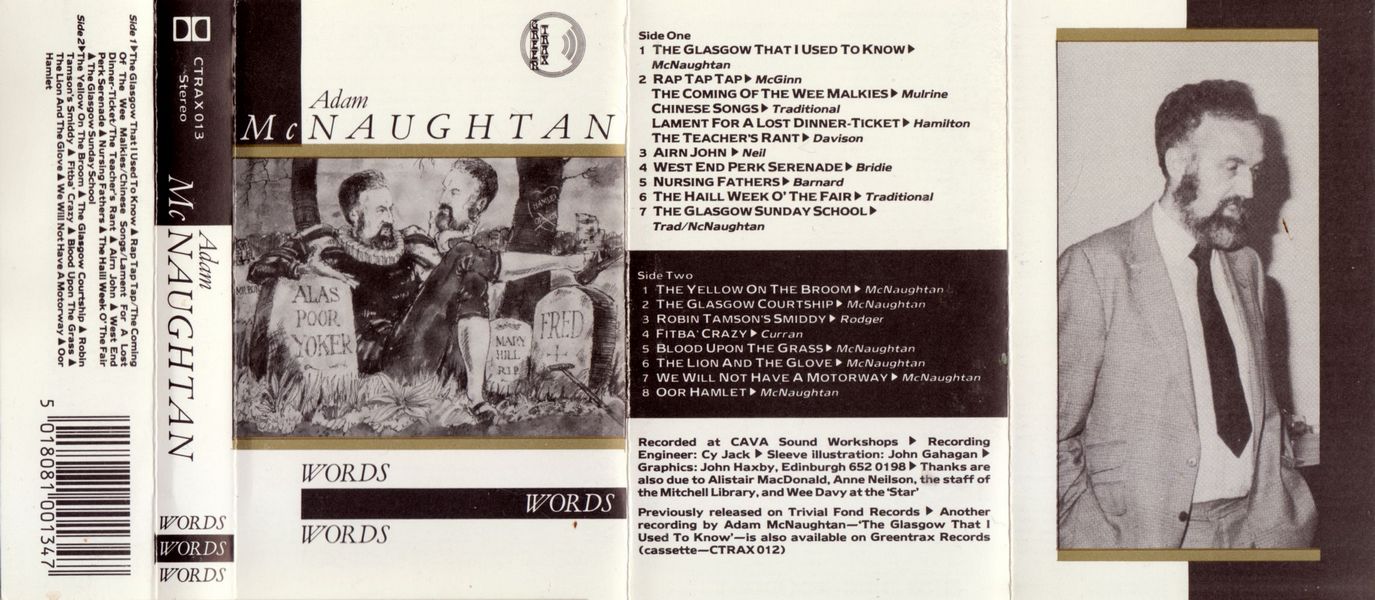
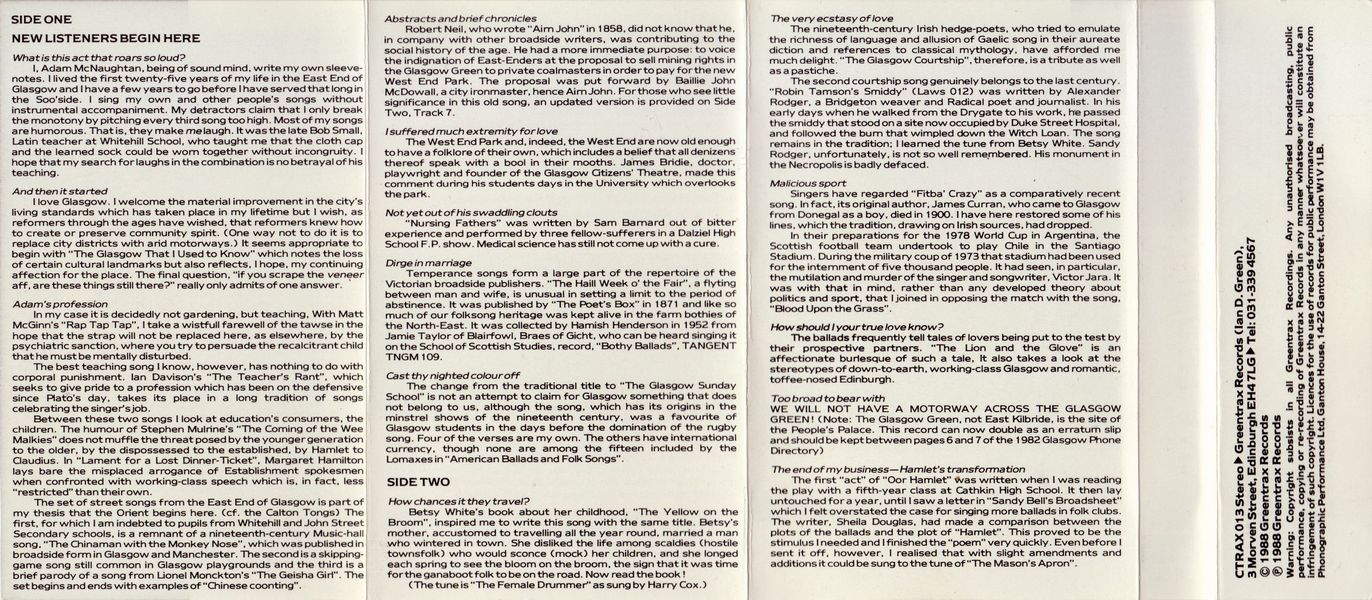
|
Sleeve Notes
What is this act that roars so loud?
I, Adam McNaughtan, being of sound mind, write my own sleeve-notes. I lived the first twenty-five years of my life in the East End of Glasgow and I have a few years to go before I have served that long in the Soo'side. I sing my own and other people's songs without instrumental accompaniment. My detractors claim that I only break the monotony by pitching every third song too high. Most of my songs are humorous. That is, they make me laugh. It was the late Bob Small, Latin teacher at Whitehill School, who taught me that the cloth cap and the learned sock could be worn together without incongruity. I hope that my search for laughs in the combination is no betrayal of his teaching.
And then it started
I love Glasgow. I welcome the material improvement in the city's living standards which has taken place in my lifetime but I wish, as reformers through the ages have wished, that reformers knew how to create or preserve community spirit. (One way not to do it is to replace city districts with arid motorways.) It seems appropriate to begin with "The Glasgow That I Used to Know" which notes the loss of certain cultural landmarks but also reflects, I hope, my continuing affection for the place. The final Question, "if you scrape the veneer aff, are these things still there?" really only admits of one answer.
Adam's profession
In my case it is decidedly not gardening, but teaching.. With Matt McGinn's "Rap Tap Tap", I take a wistful farewell of the tawse in the hope that the strap will not be replaced here, as elsewhere, by the psychiatric sanction, where you try to persuade the recalcitrant child that he must be mentally disturbed.
The best teaching song I know, however, has nothing to do with corporal punishment. Ian Davison's "The Teacher's Rant", which seeks to give pride to a profession which has been on the defensive since Plato's day, takes its place in a long tradition of songs celebrating the singer's job.
Between these two songs I look at education's consumers, the children. The humour of Stephen Mulrine's "The Coming of the Wee Malkies" does not muffle the threat posed by the younger generation to the older, by the dispossessed to the established, by Hamlet to Claudius. In "Lament for a Lost Dinner-Ticket", Margaret Hamilton lays bare the misplaced arrogance of Establishment spokesmen when confronted with working-class speech which is, in fact, less "restricted" than their own.
The set of street songs from the East End of Glasgow is part of my thesis that the Orient begins here. (cf. the Gallon Tongs) The first, for which I am indebted to pupils from Whitehill and John Street Secondary schools, is a remnant of a nineteenth-century Music-hall song, "The Chinaman with the Monkey Nose", which was published in broadside form in Glasgow and Manchester. The second is a skipping-game song still common in Glasgow playgrounds and the third is a brief parody of a song from Lionel Monckton's "The Geisha Girl". The set begins and ends with examples of "Chinese coonting".
Abstracts and brief chronicles
Robert Neil, who wrote "Aim John" in 1858, did not know that he, in company with other broadside writers, was contributing to the social history of the age. He had a more immediate purpose: to voice the indignation of East-Enders at the proposal to sell mining rights in the Glasgow Green to private coalmasters in order to pay for the new West End Park. The proposal was put forward by Baillie John McDowall, a city ironmaster, hence Aim John. For those who see little significance in this old song, an updated version is provided on Side Two, Track 7.
I suffered much extremity for love
The West End Park and, indeed, the West End are now old enough to have a folklore of their own, which includes a belief that all denizens thereof speak with a bool in their mooths. James Bridie, doctor, playwright and founder of the Glasgow Citizens' Theatre, made this comment during his student days in the University which overlooks the park.
Not yet out of his swaddling clouts
"Nursing Fathers" was written by Sam Barnard out of bitter experience and performed by three fellow-sufferers in a Dalziel High School F.P. show. Medical science has still not come up with a cure.
Dirge in marriage
Temperance songs form a large part of the repertoire of the Victorian broadside publishers. "The Haill Week o' the Fair", a flyting between man and wife, is unusual in setting a limit to the period of abstinence. It was published by "The Poet's Box" in 1871 and like so much of our folksong heritage was kept alive in the farm bothies of the North-East. It was collected by Hamish Herderson in 1952 from Jamie Taylor of Blairfowl, Braes of Gicht, who can be heard singing it on the School of Scottish Studies' record, "Bothy Ballads", TANGENT TNGM 109.
Cast thy nighted colour off
The change from the traditional title to "The Glasgow Sunday School" is not an attempt to claim for Glasgow something that does not belong to us, although the song, which has its origins in the minstrel shows of the nineteenth century, was a favourite of Glasgow students in the days before the domination of the rugby song. Four of the verses are my own. The others have international currency, though none are among the fifteen included by the Lomaxes in "American Ballads and Folk Songs".
How chances it they travel?
Betsy White's book about her childhood, "The Yellow on the Broom", inspired me to write this song with the same title. Betsy's mother, accustomed to travelling all the year round, married a man who wintered in town. She disliked the life among scaldies (hostile townsfolk) who would sconce (mock) her children, and she longed each spring to see the bloom on the broom, the sign that it was time for the ganaboot folk to be on the road. Now read the book!
(The tune is "The Female Drummer" as sung by Harry Cox.)
The very ecstasy of love
The nineteenth-century- Irish hedge-poets, who tried to emulate the richness of language and allusion of Gaelic song in their aureate diction and references to classical mythology, have afforded me much delight. "The Glasgow Courtship", therefore, is a tribute as well as a pastiche.
The second courtship song genuinely belongs to the last century. "Robin Tamson's Smiddy" (Laws 012)was written by Alexander Rodger, a Bridgeton weaver and Radical poet and journalist. In his early days when he walked from the Drygate to his work, he passed the smiddy that stood on a site now occupied by Duke Street Hospital, and followed the burn that wimpled down the Witch Loan. The song remains in the tradition; I learned the tune from Betsy White. Sandy Rodger, unfortunately, is not so well remembered. His monument in the, Necropolis badly defaced.
Malicious sport
Singers have regarded "Fitba' Crazy" as a comparatively recent song. In fact, its original author, James Curran, who came to Glasgow from Donegal as a boy, died in 1900. I have here restored some of his lines, which the tradition, drawing on Irish sources, had dropped.
In their preparations for the 1978 World Cup in Argentina, the Scottish football team undertook to play Chile in the Santiago Stadium. During the military coup of 1973 that stadium had been used for the internment of five thousand people. It had seen, in particular, the mutilation and murder of the singer and songwriter, Victor Jara. It was with that in mind, rather than any developed theory about politics and sport, that I joined in opposing the match with the song, "Blood Upon the Grass".
How should I your true love know?
The ballads frequently tell tales of lovers being put to the test by their prospective partners. "The Lion and the Glove" is an affectionate burlesque of such a( tale. It also takes a look at the stereotypes, of down-to-earth, working-class Glasgow and" romantic, toffee-nosed Edinburgh.
Too broad to bear with
WE WILL NOT HAVE A MOTORWAY
ACROSS THE GLASGOW GREEN!
(Note: The Glasgow Green, not East Kilbride, is the site of the People's Palace. This record can now double as an erratum slip and should be kept between pages 6 and 7 of the 1982 Glasgow Phone Directory)
The end of my business - Hamlet's transformation
The first "act" of "Oor Hamlet" was written when I was reading the play with a fifth-year class at Cathkin High School. It then lay untouched for a year, until I saw a letter in "Sandy Bell's Broadsheet" which I felt overstated the case for singing more ballads in folk clubs. The writer, Sheila Douglas, had made a comparison between the plots of the ballads and the plot of "Hamlet". This proved to be the stimulus I needed and I finished the "poem" very quickly. Even before I sent it off, however, I realised that with slight amendments and additions it could be sung to the tune of "The Mason's Apron".